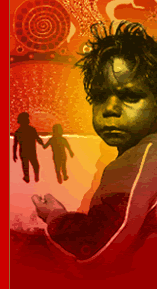

|
|
||
Draft SNAICC policy - your feedback invitedSNAICC invites you to provide comment and feedback on two draft SNAICC policy documents:
These policies emerged from SNAICC's 2007 Annual General Meeting in Cairns last November. After further developing these two drafts, the SNAICC National Executive now invites feedback on these Draft Statements from SNAICC's membership and stakeholders. Your feedback will inform the National Executive's finalisation of the documents in May this year. You can send your feedback and comments to SNAICC's Executive Officer, Julian Pocock, by 4 May 2007.
SNAICC Draft Policy Statement - Developing an effective child well-being and protection system -This draft Statement of Principles sets out the guiding principles that SNAICC expects all state, territory and federal governments to uphold in developing and implementing an effective and integrated child welfare and protection system in Australia. Like the Aboriginal Child Placement Principle, these principles would underpin how governments approach child welfare and child protection policies and decisions, and uphold Aboriginal and Torres Strait Islander children's cultural rights as part of their wider rights. SNAICC Values Statement for Aboriginal and Torres Strait Islander childrenThis draft Statement outlines the values and principles that underpin how we, as Aboriginal and Torres Strait Islander community controlled children's and families' organisations, hold Aboriginal and Torres Strait Islander children as important to our communities. It says what we value about our children, and what we value for them. Underpinning these values are our commitment to Aboriginal and Torres Strait Islander children's rights to know their culture, to know their community, and to know and learn from their Elders, and also underpin how our communities value children.
|
||
